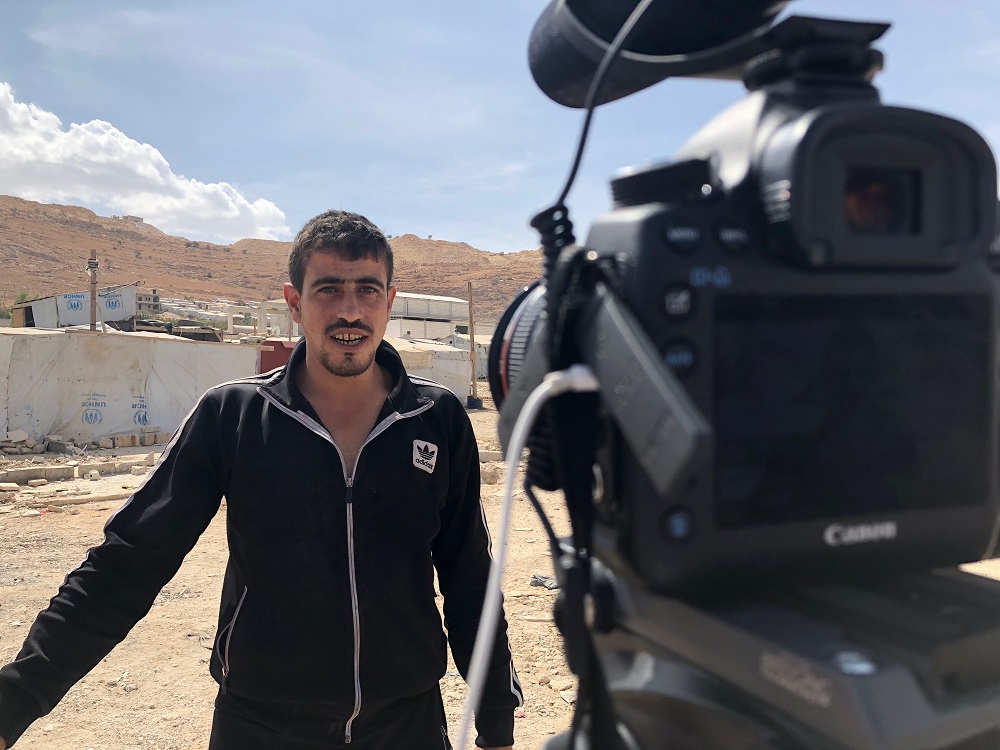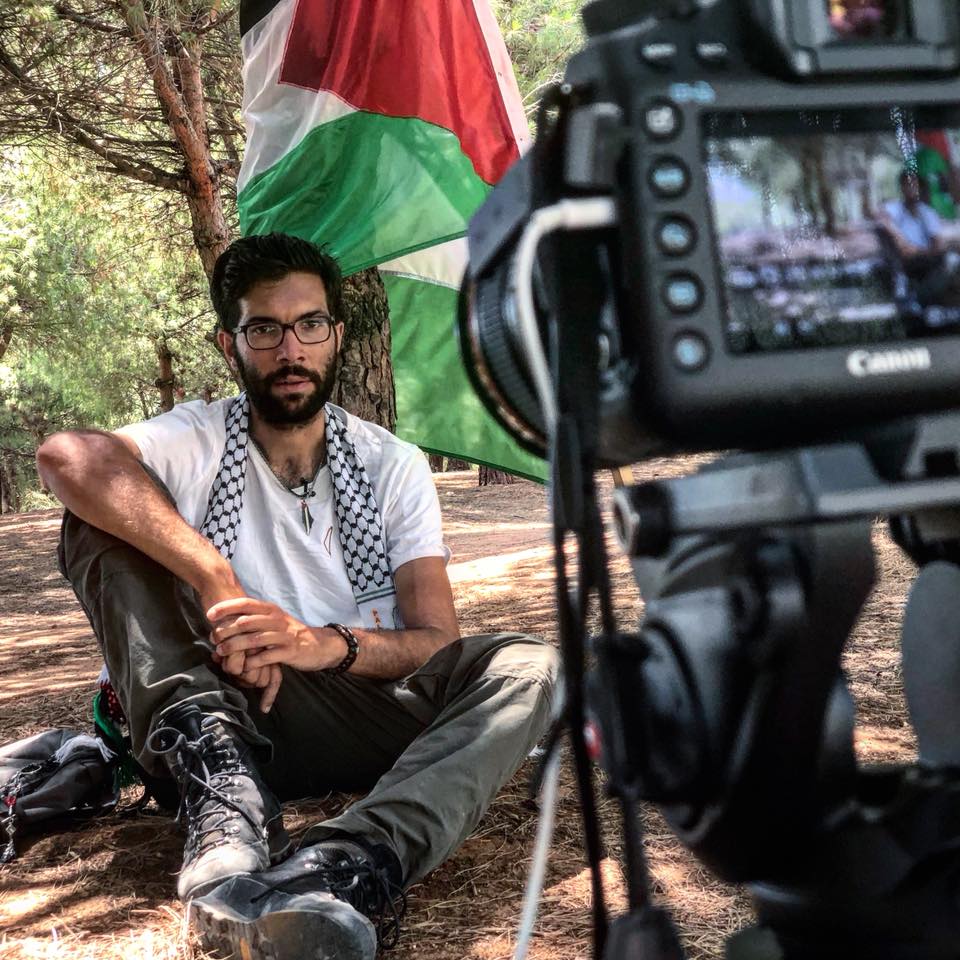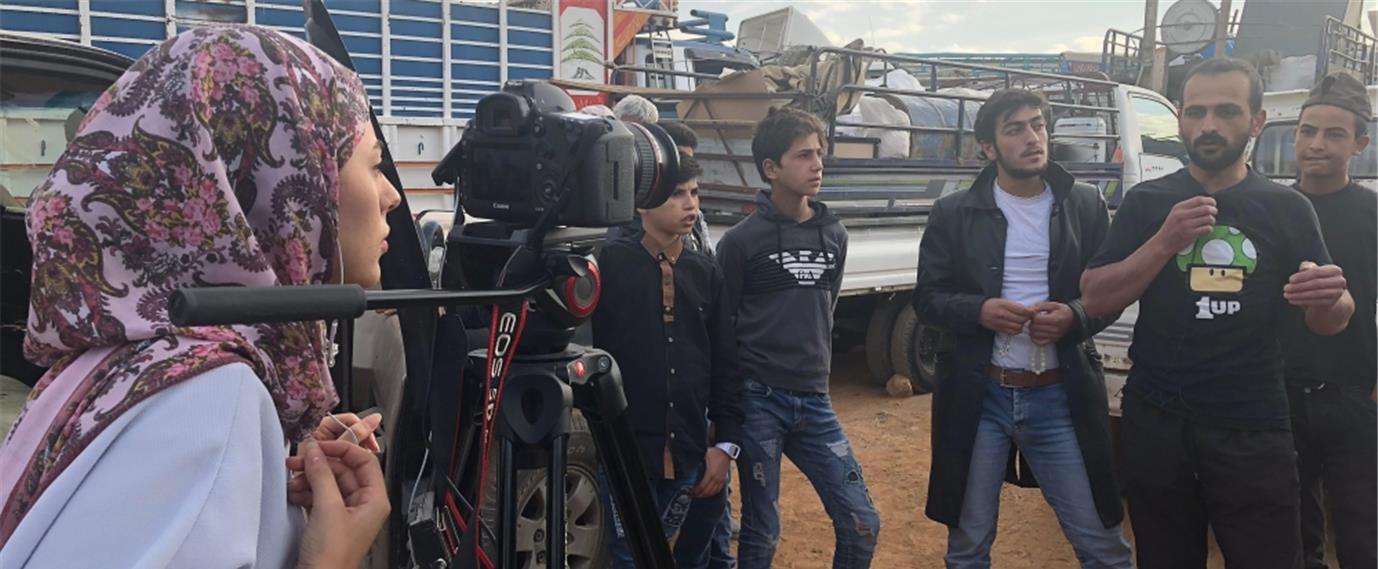في طريقي إلى منطقة البقاع اللبنانية.. ساعتان أو ربما ثلاثة من مقرّ سكني في بيروت.. في المقعد الخلفي، كاميرتي وحاملتها، رفاقي الجدد، وفي المقعد الجانبي فراغ يزيد من توتري. أقود سيارتي ذاهبة وحدي نحو قصة صحفية جديدة.. لم أكن حينها مستجدة على العمل الإعلامي، بل أذكر أنّه كان عامي الرابعفيه.. الجديد كان نوع المهمة؛ مصوّرة صحفية.. تجربة التخلي الأول عن زملائي المصورين، وهم -ليس بحكم الصدفة طبعا- دائما من الذكور، بل والتخلي أيضا عن مساعديهم الكثر.
فجأة، وجدتني أستبدل فريق العمل بنفسي.
العربة ما زالت في طريقها إلى التقرير.. هاتفي يرنّ: "وين صرتوا؟" يقول صاحب القصة التي أقصدها.. أجيب بصيغة المفرد لكي أمهد له مشهد قدومي إليه وحدي "دقائق وأصل إليك".
لم أستغرب مفاجأته: "أين الفريق؟"، أجبت: "أنا الفريق".. لم يتكلّف ابتسامة، ولم أتكلّف جهد طمأنته.. لا بأس، كنت مثله غير واثقة.
كان هذا قبل عامين.. وقبل يومين، قصدت طريقا مشابها نحو قصة أخرى.. وحدي مجددا، مع كاميرتي نفسها وحاملتها، وبعض المعدات الجديدة، فالعائلة لا بد أن تكبر.. هذه المرة، لم أقصد شخصا لتصوير "نجاحه"، بل قصدت بلدة كاملة.. كنتُ في مهمة قضاء يومين داخل قرية حدودية مع سوريا من أجل إنتاج سلسلة من القصص المصوّرة عن حياة اللاجئين فيها.
الجملة ذاتها مرة أخرى، إنما بدهشة أكبر: "أين الفريق؟"، "أنا الفريق".. مجددا، لم أتكلف جهد الطمأنة، لأنّ هذا ما كنت عليه بالفعل.
غموض المصطلح
الاستثناء وارد، لكن المؤكد أنّ مشهد المصوّر بكاميرته الضخمة، يجاوره صحفي -أو صحفية- بورقة وقلم، هي الصورة الذهنية عن المراسل التلفزيوني.. ليس لدى العموم فقط؛ فمفهوم "صحافة الفيديو" نادر الذكر في المقررات الجامعية بلبنان وفي المؤسسات المحلية أيضا.
قد تبدو المشكلة أنّها بطء في تبني التجربة، ففي أميركا نفسها -مكان ولادتها- ومن ثم في أوروبا، استغرقت صحافة الفيديو سنوات قبل أن تصبح بالأهمية التي هي عليها اليوم. لكنها تجربة جاوزت 30 عاما في تلك البلدان! قد لا يكون هذا بطئا منّا فحسب، بل جمودا مقلقا!
المفهوم شديد البساطة: صحفي الفيديو إعلاميّ كغيره، لكنّ مهمته جامعة، إذ عليه أن يختصر عدة أدوار في نفسه: أن يبحث عن القصة، يُقنع مدير تحريره بها، يصورها، يخضعها للمونتاج، ويكتب نصها؛ مع كل ما تشتمله هذه الخطوات من مهام تفصيلية. بمعنى آخر، صحفي الفيديو هو المنتج الوحيد لتقرير تلفزيوني كامل.
صاحب الفكرة هو الأميركي مايكل روزنبلوم.. كان شابا يافعا (32 عاما) حين التمس في هبوط أسعار معدات الفيديو فرصة لإطلاق فكرته: الصحافة للجميع.. حماسه لم يرُق لكثيرين، لكن كان كافيا أن يحظى بثقة مؤسسة عالمية واحدة -مثل البي.بي.سي- لتنطلق فكرته في التغيير جذريا في عمل الصحافة التلفزيونية في العالم.
صراع الصحفي والمصوّر
ليس مستغربا أن يشعر المصوّر بالخطر من هذه التجربة الحديثة في لبنان.. أتلمّس توجسا من زملائي المصورين، لا سيما أنّي أتقاضى أجرهم مقابل وظيفتين: الصحافة والتصوير.
مع ذلك، لا يمكن للصحفي أن يدّعي إتقان التصوير بمستوى أصحاب التخصص. لكن السؤال الذي يطرح نفسه: هل ما زال الإعلام متمسكا بالمعايير الفنية للصورة؟
أذكر جيدا أنّ في تدريبي الأول على صحافة الفيديو، عرضتْ المدربة نموذج تقرير لمناقشته.. كان العمل بلغتها الألمانية.. عقب مشاهدة التقرير سؤال: ماذا فهمتم؟ لم تكن الغاية اختبار مستوانا اللغوي في الألمانية طبعا، وإنما إثبات القاعدة الأولى في صحافة الفيديو: رسالة التقرير تصنعه الصورة.. اللغة عنصر ثانوي.
التقرير النموذج تخللته أخطاء تقنية واضحة؛ من كسر لقواعد الضوء ومشاكل في التأطير.. اللافت أن أحدا لم يكترث، فالقصة أحدثت إشباعا بصريا بصرف النظر عن تفاصيل الجودة.
لا شك أن صحافة الفيديو استثمار مادي لأصحاب المؤسسات.. عدّة وظائف لشخص واحد، معادلة مربحة. لكنّ المؤسسات الإعلامية الكبرى لم تتبنّ هذا المفهوم لتوفيره المالي فحسب.
نضجت القناعة بأنّ منتج الفكرة هو الأقدر على تنفيذها، بمعنى أنّ الصحفي أجدر باختيار صوره بما يتلاءم مع رسالته، وأنّ المصوّر -مهما بلغ احترافه- لن يكون بمستوى إدراك الصحفي بما يحتاجه التقرير من عناصر بصرية.. هذا توجه ليس عليه إجماع، لكنّ الأكيد أن مناصريه ليسوا بقلة.
هنا نصل إلى المفهوم الملازم لصحافة الفيديو: السرد القصصي من خلال الصورة.. إذًا، لا بد من تداخل وظيفي بين المصور والصحفي لإنجاح المفهوم. ولهذه الغاية، ترافقت صحافة الفيديو بقواعد ميّزتها، كاللقطات الخمس: صوّر الفعل أولا، ثم الوجه، ثم المكان، إلخ.. تقنيات أبسط بكثير مما يجيده المصوّر عادة، لكنها رغم ذلك تتحدد بحسب القصة. وقد لا يشعر المصور بقناعة هذا التسلسل، لأنّه بطبيعة الحال يولي للتقنية الأولوية على حساب الرسالة، في حين أن الصحفي يبقى المدافع الأول عنها.

العمل محليا
بالوصول إلى السرد القصصي، ينبغي التأكيد أن مصطلح "قصة" لا يستخدم عبثا.. واحد من أهم مبادئ صحافة الفيديو هو تحويل الخبر الصرف إلى قصة متكاملة لا تخلو من عناصر التشويق.
قد يبدو الأمر مضحكا إذا ما أسقطناه على قضايانا المحلية.. فلنأخذ مثلا قضية كأزمة النفايات في لبنان: هل يمكن تحويل موضوع كهذا إلى ما يشبه فيلما قصيرا؟ هذه بالضبط الفكرة من صحافة الفيديو.
الخطوة الأولى تكون باختيار زاوية.. لا بد للتقرير أن يتناول فكرة واحدة تُبنى الصورة والنص على أساسها.. بعدها يتم اختيار "البطل"؛ شخصية جاذبة تقود القصة. في مثلنا السابق، قد يكون البطل صاحب مبادرة تسعى للحد من التلوث.. سنرافقه على طول الفيديو، ننتقل معه من مكب إلى آخر، نراه في معمله الخاص للتدوير، وبرفقة مختصين أو متضررين. بمعنى آخر، سيحكي لنا هذا البطل قصته التي تعبر في النهاية عن قضية تكبره.. الفكرة ببساطة إضفاء عنصريْ التشويق والبساطة على القضايا، لضمان تأثير أكبر على المشاهد.
هذا ما لا نراه إلا نادرا في القنوات المحلية.. لِنُجْرِ مسحا على تقارير نشرات المساء.. مجددا، مثال النفايات هذا، كيف يمكن أن نراه؟ مشاهد أرشيفية، لقطات بعيدة تخلو من الشخصيات، مقابلات مطولة مع مسؤولين، وحشو لأرقام ومعلومات.
بهذا، صحافة الفيديو لم تحدث تحولا وظيفيا أو تقنيا، بل تحولا جذريا في مفهوم الخبر الصحفي نفسه، إذ حوّلته من نص مقروء إلى صور شديدة التناسق.
الخلاصة أنّها فرصة لتأثير أكبر بتكلفة أقل!
تاء التأنيث.. فرصة أم تعقيد؟
لا تخلو التجربة من بعض المواقف المزعجة.. ثمّة جلبة يحدثها مشهد امرأة في يدها آلة؛ أيّا تكن هذه الآلة. لكن يمكن للجلبة هذه أن تكون فرصة بقدر ما هي تحدٍّ.
عموما، صحافة الفيديو تتميز بالخفّة.. عدد أقل من الأفراد والمعدات، بما يعني راحة وعفوية أكبر في العمل.. هذا النوع من العمل يعطي إحساسا بالخصوصية بين الصحفي المصور والشخصية التي يعمل معها، كأنّ العمل مساحة مغلقة بين طرفين.
يزيد من السهولة أحيانا كون المصور امرأة.. هذا استنتاج شخصي لا أدّعي تعميمه.. الجندرية هنا تنحاز إلى صالح المرأة إذا ما كانت القصة حساسة، كقصص الاغتصاب والزواج المبكر.
وجودي المستقل مع البطلة يمنحني فرصة إضافية للتعمّق في قصتها.. أمر لا أحصل عليه دائما برفقة زملاء. علاوة على أن الصحفية تعطي إحساسا أعلى بالأمان في الأماكن أو المواضيع التي تحمل حساسية أمنية.
لكنّ للتجربة جانبا لا يخلو من الصعوبة.. في التصوير جهد جسدي مضاعف رغم صغر الكاميرات، إلا أنّ وزن المعدات ككل غير هيّن، خاصة أن العمل قد يصل إلى 12 ساعة متواصلة! هذا إذا ما استثنيا جهد قيادة السيارة، والخطوات السابقة واللاحقة للتصوير. ولن يكون من المنطق الاستعانة "بصديق" للمساعدة، إذا ما أخذنا أن الربح النهائي للتقرير يصعب تقاسمه.
قد أكون أكثر حظوة من بعض الزميلات العاملات في مجتمعات أكثر انغلاقا من لبنان، لكن ذلك لا يلغي أن تجربة صحافة الفيديو تنحاز إلى صف الذكور في مسألة الأمان.

موت قبل الولادة
يذكر مؤسس صحافة الفيديو روزنبلوم في إحدى مقالاته الحديثة لمجلة "هافينغ بوست" موقفا جمعه بصديقه بنتلي، المصور الفوتوغرافي لمجلة "التايم". عمر الموقف قريب من عمر تأسيسه لفكرة صحافة الفيديو.. كان حينها في أوج عمله على مفهومه الجديد.. دعاه صديقه المصور لمرافقته في تغطية مناسبة سياسية.. يقول روزنبلوم: "أخرج بنتلي من حقيبته قطعة أنيقة.. كانت أول كاميرا رقمية لشركة كانون.. أمسك بها ووجّهها للحدث، والتقط عددا مذهلا للصور بسرعة ودقة عالية".
يتابع: "لكن صديقي كان يحمل في يده بذور تدمير مهنته، لأنه إذا تمكن هو من التصوير بهذه السهولة فيمكن لأي شخص آخر القيام بذلك.. قد لا يملك الآخرون عينَه في التصوير، ولكن ربما لن تهتم مجلة التايم بذلك.. وتبين لاحقا، أنهم لم يهتموا بالفعل".
حقائبنا اليوم تُخرج آلات أقل تعقيدا من كاميرا صديق روزنبلوم، وكلما صغرت الآلة كبر السؤال عن قدرة صحافة الفيديو على الصمود.
هل تموت صحافة الفيديو حتى قبل أن تولد بشكل حقيقي في منطقتنا؟
"كم من الوقت يلزمنا قبل أن تحل مقاطع فيديو الآيفون محل أعمال محترفي الفيديو؟ أظن خمس سنوات وربما أقل".. بهذا يختم روزنبلوم مقالا كتبه قبل خمس سنوات.







































